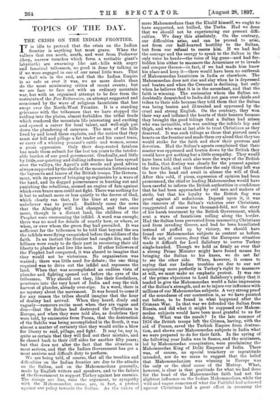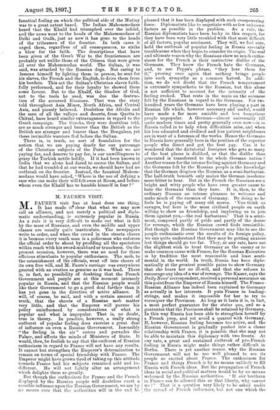TOPICS OF THE DAY.
1.11E CRISIS ON THE INDIAN FRONTIER.
IT is idle to pretend that the crisis on the Indian frontier is anything but most grave. When the valleys that run north, south, and west from Peshawur (deep, narrow trenches which form a veritable giant's labyrinth) are swarming like ant - hills with angry and fanatical tribesmen, no good is done by talking as if we were engaged in one of our usual little wars. That we shall win in the end, and that the Indian Empire is as safe as ever it was, we no more doubt than do the most minimising critics of recent events ; but we are face to face not with an ordinary mountain war, but with an organised attempt to be free from the restraints of the Paz Britannica, an attempt suggested and occasioned by the wave of religious fanaticism that has swept over the North-West Frontier. It is a standing grievance with the tribesmen that we have stopped the raiding into the plains, almost forbidden the tribal feuds which rendered the mountain life interesting and exciting and opened a career for local talent, and well-nigh put down the plundering of caravans. The men of the hills lived by and loved these exploits, and the notion that they must not kill and pillage a fat trader and his camel train, or carry off a whining peasant's cattle and women, seems a gross oppression. Only their deep-rooted fatalism has made them submit for the last ten years to the intoler- able burden of our good government. Gradually, and little by little, our quieting and dulling influence has been spread over the valleys, the Agent's soft words and good advice always supported bythe shells of the mountain batteries and the bayonets and lances of the British troops. The Govern- ment, with its power of bringing up regiments by a wave of the hand, and its dogged perseverance in hunting out and punishing the rebellious, seemed an engine of fate against which even brave men could not fight. There was nothing for it but to submit more or less quietly to the decree of God, which clearly ran that, for the time at any rate, the unbeliever was to prevail. Suddenly came the news that the Almighty will had changed, and that once more, though in a distant land, the children of the Prophet were overcoming the infidel. A word was enough; there was no need for details of exactly how, or where, or when, or over whom the green flag had prevailed. It was sufficient for the tribesmen to be told that beyond the sea the infidels were flying vanquished before the soldiers of the faith. In an instant the frontier had caught fire, and the hillmen were ready to do their part in recovering their old liberty to plunder and live like men. If other followers of the Prophet had conquered, it was absurd to imagine that they would not be victorious. No organisation was wanted ; there was little need for debate; the one thing required was to drive out the infidel and repossess the land. When that was accomplished an endless vista of plunder and fighting opened out before the eyes of the tribesmen. Why should not they, like their forefathers, penetrate into the very heart of India and reap the rich harvest of plunder, already over-ripe. In a word, there is no mystery about the movement. It was bound to come if for any reason the tribes should imagine that the hour of destiny had arrived. When they heard, dimly and vaguely—rumours excite most when they are vague and dim—that the Sultan had destroyed the Christians in Europe, and when they were told also, as doubtless they were told, by emissaries from Poona, that the destruction of the Sahibs was being accomplished in the South, it was almost a matter of certainty that they would strike a blow for liberty to raid, pillage, and fight. It may be, nay is, quite as certain that they will find out their mistake, and be chased back to their cliff sides for another fifty years ; but that does not alter the fact that the situation is most serious, and that the Indian Government has got a most anxious and difficult duty to perform. We are being told, of course, that all the troubles and difficulties on the Indian frontier are due to the attacks on the Sultan, and on the Mahommedans generally, made by English writers and speakers, and to the failure of the Government to support Turkey against her enemies. The risings are due, runs the argument, to sympathy with the Mabommedan cause, are, in fact, a protest against our policy towards the Sultan. As the rulers of more Mahommedans than the Khalif himself, we ought to have supported, not bullied, the Turks. Had we done that we should not be experiencing our present diffi- culties. We deny this absolutely. On the contrary, our difficulties arise, and can be proved to arise, not from our half-hearted hostility to the Sultan. but from our refusal to coerce him. If we had ha& the courage and the energy to speak to the Sultan in the only voice he heeds—the voice of big guns—and had for- bidden him either to massacre the Armenians or to invade and conquer Greece—in fact, if we had made him know his place and keep it—there would have been no outbreak of Mahommedan fanaticism in India or elsewhere. The Mahommedan does not rise and slay when he is depressed and beaten and when the Crescent is declining, but only: when he believes that it is in the ascendant, and that the faith is winning. The emissaries whom the Sultan un- doubtedly despatched to India did, not gain over chiefs and tribes to their side because they told them that the Sultan was being beaten and ill-treated and oppressed by they cruel and strong English. On the contrary, they won their way and inflamed the hearts of their hearers because they brought the good tidings that a Sultan had arisen who was invincible, who was smiting the infidels hip and: thigh, and who was at last able to treat Christians as they deserved. It was such tidings as these that pierced men's. hearts on the frontier and made them cry aloud that they too would strike for the faith and show their prowess and' devotion. Had the Sultan's agents complained that their' master was oppressed and beaten down by the British they would have got nothing but a little sympathy. They would' have been told that such also were the ways of the British in India, that destiny was clearly for the present against• the true faith, and that therefore the only thing left was to bow the bead and await in silence the will of God. Afterthis cold, if pious, expression of opinion had been pronounced, the chief or leading Mahommedan would have been careful to inform the British authorities in confidence that he had been approached by evil men and makers of strife, but that his loyalty to the British flag was• proof against all seductions. Depend upon it, it was the rumours of the Sultan's victories over Christians,. exaggerated of course ten thousand-fold, not the story of his harsh treatment by the British Government, which sent a wave of fanaticism rolling along the border. Had the Sultan been prevented from massacring Christians and from invading Greece, and had he been humiliated instead of puffed up by victory, we should have found our Mahommedan subjects as content as before. We do not, of course, deny that the European situation made it difficult for Lord Salisbury to coerce Turkey- single-handed. Though we hold as firmly as ever that a strong Prime Minister might have found means foi bringing the Sultan to his knees, we do not fail to see the other side. When, however, it comes te saying that our Indian troubles are due to our not acquiescing more perfectly in Turkey's right to massacre at will, we must make an emphatic protest. It was one of the prime objections to Lord Salisbury's policy that it tended to give the Mahommedan world a false impression of the Sultan's strength, and so to injure our influence with, millions of our Mahommedan subjects. A very strong proof of the soundness of our contention is, as we have pointed out before, to be found in what happened after the Crimean War. In that war we defended the Sultan from Russia, and did what it might be supposed our Mahom- medan subjects would have been most grateful to us for doing. What was the result? In the late summer of 1856 the British troops left the Crimea, having, with the aid of France, saved the Turkish Empire from destruc- tion, and shown our Mahommedan subjects in India what we were prepared to do for their faith. In the spring of the following year India was in flames, and the mutineers, led by Mahommedan conspirators, were proclaiming the Mahommedan King of Delhi Emperor of India. There was, of course, no special treachery or ingratitude intended, nor do we mean to suggest that the belief that Mahommedanism was winning in Europe was the only or the chief cause of the Mutiny. What, however, is clear is that gratitude for what we had done for the head of the Mahommedan faith had not the slightest influence on the Indian Mahommedans, while the wild and vague rumours of what the Faithful had achieved against Christians had a great effect in arousing the fanatical feeling on which the political side of the Mutiny was to a great extent based. The Indian Mahommedans heard that the Khalif had triumphed over the infidel, and the news went to the heads of the Mahommedans of Delhi and Oudh, just as now it has gone to the heads of the tribesmen of the frontier. In both cases it urged them, regardless of all consequences, to strike a blow for the faith. The descriptions that have been given of the Greek War to the frontiersmen are probably not unlike those of the Crimea that were given all over the Mahommedan world. The Sultan, it was said, was attacked by the Russian dogs. Not caring to demean himself by fighting them in person, he sent for his slaves, the French and the English, to drive them from his borders. This act the Sultan's Christian slaves faith- fully performed, and for their loyalty he showed them some favour. But to the Khalif, the Shadow of God, not to the tools he used, was due the destruc- tion of the accursed Russians. That was the story told throughout Asia Minor, North Africa, and Central Asia, and piously believed. Doubtless the Afridis and the men of all the valleys and deserts, from Quetta to Chitral, have heard similar extravagances in regard to the Greek campaign. The Greeks, they were doubtless told, are as much stronger and braver than the British as the British are stronger and braver than the Bengalees, yet these invincible warriors fled before the Sultan.
There is, in truth, no sort of foundation for the notion that we are paying dearly for our patronage of the Christian subjects of the Porte. What we are paying for, and deserve to pay for, is our unwillingness to grasp the Turkish nettle boldly. If it had been known in India that we alone had dared to coerce the Sultan, and that he had trembled at our words, we should have had no outbreak on the frontier. Instead, the fanatical Mahom- medans would have asked, 'Where is the use of defying a race who can make their will felt even at Roum, and before whom even the Khalif has to humble himself in fear ? '



































 Previous page
Previous page